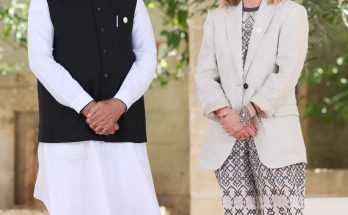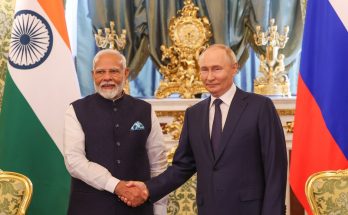
The maiden India-Nordic Summit in Stockholm culminated in a template of a mutually empowering partnership driven by technology, innovation and sustainable development, opening new vistas for expanding partnership in diverse areas, says Ashok Sajjanhar
India and Nordic countries may be thousands of miles away, but shared values and convergence of interests in technology, innovation and clean energy animated the first India-Nordic summit in Stockholm on April 17. The enthusiasm and energy were palpable as Prime Minister Narendra Modi sat down for wide-ranging talks with the leaders of five countries of the region.
PM Modi held separate meetings with Prime Ministers of Denmark, Finland, Iceland and Norway, all of whom travelled to Stockholm for the India-Nordic Summit as well as to hold bilateral talks with the Indian prime minister. This was for the second time that the five Nordic countries came together to have a Summit with a foreign country. The first was in 2013 when the leaders of all five countries assembled to meet then US President Barack Obama in Stockholm. In a reciprocal gesture, Obama hosted leaders of all the five countries in the White House in Washington DC, in May, 2016.
Shared Values & Interests
The theme of the India-Nordic Summit was “Shared Values, Mutual Prosperity.” This was appropriate as all five Nordic countries and India are vibrant and stable democracies. They share a convergence of values in freedom of speech, religion and media; all are free market economies; and all of them promote gender equality, women empowerment, social justice and human rights. The Nordic countries have created the most peaceful zone of political and economic stability, which has raised the standard of living of all their citizens.
The five Nordic states share significant complementarities and strengths. International, regional and bilateral cooperation amongst them has witnessed far-reaching progress in recent years. In addition, all these countries figure amongst the top achievers in various areas of human activity and endeavour, particularly innovation, clean energy, green technologies, education, health-care, conversion of waste to energy, transparency, good governance, social justice, human rights and rule of law. This presents enormous opportunities for India to tap the strengths of these countries for mutual benefit and advantage.
Innovation-driven Ties
Against this larger backdrop of conjoined interests, the maiden India-Nordic Summit culminated in an ambitious multi-layered plan to forge and deepen a multi-faceted partnership pivoted around technology, innovation, investment and green growth. “The Prime Ministers acknowledged that innovation and digital transformation drive growth in an interconnected world, and underpin a growing engagement between the Nordic countries and India,” said a joint statement issued after the talks.
The key takeaway of the India-Nordic Summit was the blending of Nordic countries’ core strength in innovation and cutting-edge technologies with national flagship programmes, such as Make in India, Startup India, Digital India and Clean India. “The Summit welcomed the Nordic Sustainable Cities Project aimed at supporting the Smart Cities Program of the Government of India,” said the joint statement.
PM Modi’s visit to Stockholm was significant as this was the first prime ministerial visit from India after Rajiv Gandhi’s trip in 1988. Swedish PM Stefan Lofven went out of his way to accord a warm reception to PM Modi by receiving him at the airport. This gesture set the tone for discussions during the visit.
PM Modi’s interactions with Prime Minister Stefan Lofven and CEOs of major Swedish firms are expected to go a long way in expanding bilateral collaboration in the area of cutting-edge technologies.
A Joint Action Plan was signed between India and Sweden to provide an impetus to cooperation in innovation; smart cities and next generation transport; smart, sustainable and renewable energy; women’s skills development and empowerment; defence; space and science; and health and life sciences. The plan articulated Sweden’s support for India’s membership of an expanded UN Security Council, and Nuclear Suppliers Group.
Some agreements were signed with Sweden, Iceland and Denmark. The Joint Declaration on India-Sweden Innovation Partnership for a Sustainable Future between Ministry of Science and Technology of India and the Ministry of Enterprise and Innovation of Sweden seeks to tap into one of the niche strengths of Sweden: innovation. Agreements with Denmark relate to agriculture research, food safety, animal husbandry, urban development and dairy, in which Denmark has proven strengths. It was decided to establish a Chair for the Hindi language in the University of Iceland.
In his meeting with Swedish CEOs, PM Modi invited top Swedish firms to invest in India. It was decided to establish a common task force for cyber security.

The Road Ahead: Issues & Challenges
Going forward, it makes political and economic sense for these countries to step up their engagement with India. India today represents the third largest global economy at
US$ 9.5 trillion in Purchasing Power Parity terms. In nominal dollar terms as well, it graduated to the sixth position in the world late last year and is poised to jump to the fifth position by the end of this year. India is the fastest growing major economy in the world with an annual GDP growth of 7-7.5 per cent over the last many years. Several radical and wide-ranging initiatives have been taken by India in recent years, including the implementation of Goods and Services Tax, demonetisation and Jan Dhan financial inclusion scheme which have significantly increased its attractiveness as a business and investment destination. Many new flagship schemes have been launched by India ever since PM Modi assumed office, including Make in India, Smart Cities, Clean India, Namami Gange, Skill India, Startup India and Digital India, among others, in which companies from Nordic countries can take active part and evolve win-win solutions. India presents an ideal opportunity to these countries because of the large size of its market as also because of its youth dividend.
Populations in all Nordic countries are greying. The young, educated, skilled and motivated population of India can, therefore, meet an acutely felt need in these countries. These countries need large and assured markets as reliable commercial and economic partners. India eminently fits the bill.
Maintaining peace, ensuring security, undertaking balanced harvesting of mineral resources, and promoting sustainable economic development of the Arctic Region is another
area which offers rich opportunities for enhanced collaboration. India became an Observer in the Arctic Council in 2013. The five Nordic states share enormous stakes in protection, preservation as well as sustainable development of resources and ecology of the Arctic region. India fully shares and supports these interests and concerns. India and the
Nordic states can be eminently suitable partners in this endeavour.
P2P connect
A big challenge confronting India and the Nordic nations is inadequate people-to-people contacts. There is a huge information gap which divides India and the five Nordic countries. The recent decision by India to extend the e-Visa facility to the nationals of all these countries to visit India should boost tourist and business travel between these countries. Direct flight connectivity between India and Finland, Sweden and Denmark should also help bring the Nordics closer to India.
In addition to the respective governments and embassies in various capitals, it is essential for commercial organisations, business and industrial houses, civil society bodies, academic institutions, scholars and cultural performers and associations to step in and discharge their responsibilities effectively to bring the people and institutions of these countries closer. A beginning has been made in recent years with the launch of the annual “Namaste Stockholm” extravaganza by the Indian Embassy in Sweden. Similary, the Swedish Embassy in New Delhi has been organising the Nobel Week every year in its premises that have gone a long way in bringing the business, industry, art, culture, music, cuisine and literature of that country closer to the people of India. These efforts must to be continued and further replicated. Other members of the Nordic grouping and Indian embassies in these countries also need to craft such initiatives in countries of their accreditation.
Blossoming Partnership
Prime Minister Modi’s two-day visit to Stockholm has brought this burgeoning relationship into sharp focus and highlighted the immense untapped potential that exists to upgrade relations.
It is now essential to give more energy and oxygen to this blossoming partnership, both at the regional as well as at the bilateral level with Sweden and other Nordic states. The India-Nordic Summit should not be a one-off event. This welcome initiative should be taken forward by hosting a return summit with all five Nordic Prime Ministers in India in 2020 or soon thereafter.
Business Bonding
Commercial and economic relations of India with Sweden, Denmark, Finland, Iceland and Norway are vibrant and multi-faceted. They, however, present considerable opportunities for further enhancement. India’s bilateral trade in goods with Denmark, Finland and Norway is a little above US$ 1 billion. If trade in services is included, the figures will become more impressive. India suffers from a trade deficit with most Nordic nations, thus underscoring the huge untapped potential for expanding our exports in goods and services to these markets. Foreign Direct Investment from Finland to India is about US$ 419 million and from Norway about US$ 180 million. Iconic and internationally reputed companies from these countries like Telenor, SN Power, Jotun (Norway), Nokia, Kone, UPM, Wartsila (Finland), Danfoss, Grunfdfoss, Novo Nordisk, Novozymes (Denmark); Actavis Pharmaceuticals, Ossur, Reykjavik Geothermal (Iceland) have been operating in India for some time. Their number needs to increase manifold.
Indian presence in these countries also needs to grow. Considerable investment has been made in recent years by Mahindra Holidays and Resorts, Mahindra & Mahindra, and Motherson Sumi Systems Ltd in tourism, combine harvesters, and auto components respectively in Finland. Expanding Indian footprint in these countries will be a win-win proposition for both sides.
Author Profile
Latest entries
 DiplomacyMarch 31, 2021Heart of Asia: Jaishankar calls for ‘double peace’ in Afghanistan
DiplomacyMarch 31, 2021Heart of Asia: Jaishankar calls for ‘double peace’ in Afghanistan India and the WorldSeptember 11, 2020India, China forge 5-point formula to defuse border crisis
India and the WorldSeptember 11, 2020India, China forge 5-point formula to defuse border crisis India and the WorldJanuary 8, 2019India-Nordic Connect: New Horizons
India and the WorldJanuary 8, 2019India-Nordic Connect: New Horizons NewsMay 15, 2018On Iran and Trump, India has landed between a rock and a hard place
NewsMay 15, 2018On Iran and Trump, India has landed between a rock and a hard place






